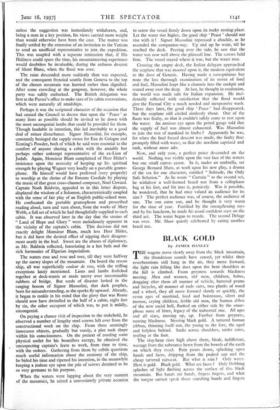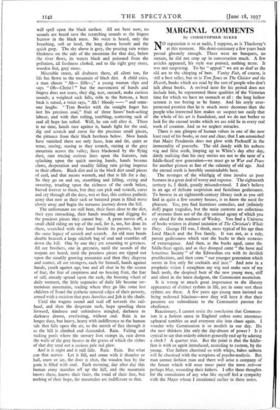BLACK GOLD
By JAMES HANLEY
THE wagons move slowly away from the black mountain, the thunderous sounds have ceased, yet whilst their reverberations still hang in the air, they move forward, the light rain falling like dust upon the bent shoulders as the hill is climbed. From greyness towards blackness moving. Men and women, old men, children, babes, dragging after them all manner of vehicle, battered prams and bicycles, all manner of rude carts, two planks of wood and a wheel, they all move forward slowly or quickly, the seven ages of mankind, loud and boisterous, silent and morose, crying children, feeble old men, the human debris of the new social hell, flanked on either side by the amor- phous mass of litter, legacy of the industrial one. All ages and all sizes, moving up, up. Further from greyness, nearing blackness. Nearing black gold. A tattered human ribbon, thinning itself out, he young to the fore, the aged and helpless behind. Sacks across shoulders, under arms, trailing at the foot.
The slag-heap rises high above them, bleak, indifferent, wastage from the substance hewn from the bowels of the earth on which they tread. Rain pours down, splashing upon hands and faces, dripping from the peaked cap and the cheap tattered raincoat. But what is rain ? Only water. Here is gold. Black gold. What are faces ? Only blobbing splashes of light flashing across the surface of this black mountain. But hands are hands, fingers fingers, and what the tongue cannot speak those searching hands and fingers will spell upon the black surface. All are bent now, no sounds are heard save the scratching sounds as the fingers burrow in the black mess. No voice is heard, only the breathing, soft or loud, the long drawn breath; and the quick gasp. The sky above is grey, the pouring rain writes bleakness on the side of the mountain for that day, below the river flows, its waters black and poisoned from the pollution, all freshness choked, and to the right grey stone, wooden hut, grey stone.
Miserable street, all drabness there, all silent too, for life has flown to the mountain of black dirt. A child cries, a man shouts " Ah— SSh—," a young woman slips and says " Oh—Christ ! " but the. movements of hands and fingers does not cease, they dig, tear, ransack, make curious sounds, a weighted sack falls, rolls to the bottom, a bent back is raised, a voice says, " Ah ! bloody — " and some- one laughs. " Tym Bowler with the straight finger has lost his precious coal," fruit of three hours' back-aching labour, and with that rolling, tumbling, scattering sack of coal all hope has rolled. Well, he can roll after it. There is no time, hands race against it, hands fight for the coal, dig and scratch and curse for the precious small pieces, the pittance from their black brethren below. Now hands have vanished there are only faces, lean and fat, quiet or tense, staring, staring as they scratch, staring at the grey mountain across the valley, faces blackened by the flying dust, rain tracing curious lines upon the features, rain splashing upon the quick moving hands, hands become claws, desperation and steadily falling rain giving impetus to their efforts. Black dirt and in the black dirt small pieces of coal, and that means warmth, and that is life for a day. So they go on and on, stumbling and falling, crying and swearing, treading upon the richness of the earth below, barred forever to them, but they can pick and scratch,' curse and cry through all the days, wet or fine, this curious pathetic army that now as their sack or battered pram is filled move slowly away and begin the tortuous journey down the hill.
The unfortunate are still bent, their faces close to the dirt, their eyes ransacking, their hands mauling and digging for the precious pieces they cannot buy. A pram moves off, a Small child riding on top of the coal, for it, too, has done its share, scratched with tiny hand beside its parents, heir to the same legacy of scratch and scratch. An old man bends double beneath a large oilcloth bag of coal and stumbles off down the hill. One by one they are returning to greyness. All are brothers, one in greyness, until the sounds of the wagons are heard, until the precious pieces are tipped out upon the steadily growing mountain and then they disperse and scatter, all are strangers, each for himself, hands against hands, youth against age, one and all shut in by the screen of fear, the fear of emptiness and no bearing fruit, the fear of self, already spread upon the rack, the burning wheel of daily torment, the little urgencies of daily life become tre- mendous mountains, trailing where they go like some lost children of Israel the pathetic tattered edges of their poverty, armed with a stoicism that puts Aurelius and Job in the shade. Until the wagons sound and trail off towards the rail- head, and then the desperate rush, hope speeding them forward, kindness and unkindness mingled, darkness to darkness drawn, everlasting, without end. Rain is no longer dust, but heavy, heavy with indifference to the human tale that falls upon the air, to the march of feet through it as the hill is climbed and descended. Rain. Falling and making pools where the unwary foot stamps in, rain down the walls of the grey houses in the grates of which the riches of that day send out a curious pale red glow.
And it is night and it still falls. Rain. Rain. But what can that matter. Let it fall, and come with it thunder or hail, snow or ice, the door is shut, the wooden box by the grate is filled with coal. Each morning, day after day this human army marches off up the hill, and the mountain knows them, knows their faces, the tread of their feet, but nothing of their hope, for mountains are indifferent to that.















































 Previous page
Previous page